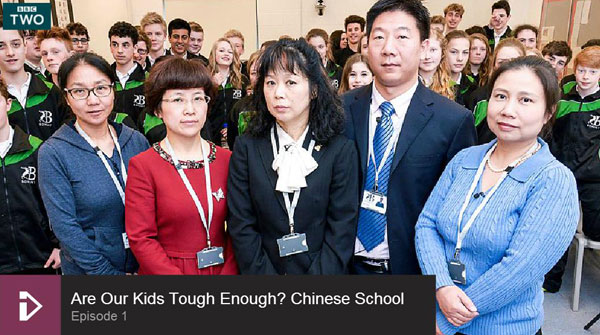BBC program highlights education difference in China, UK
By Zhang Zhouxiang in London (chinadaily.com.cn) Updated: 2015-08-05 23:58
 |
|
A still image captured from the website of BBC. [Photo/bbc.co.uk] |
Britons think their education system has to change as debate raged over a new BBC TV documentary series about Chinese teachers spending a month at an English school.
The first part of the documentary series, "Are Our Kids Tough Enough: Chinese School", was first broadcast on Tuesday evening, and is about an experiment showing five Chinese teachers teaching 50 grade-9 pupils Hampshire-based Bohunt School for a month using the teaching methods they apply in China.
The first part was watched by 1.8 million viewers, 8.6 percent of that evening's audience.
It also sparked fierce discussions online. Before and after it was broadcast, "Chinese School" has already become one of the top topics on Twitter, with all kinds of education specialists making comments and retweeting.
Interestingly, many British Twitter users complained about their own education system rather than that used by the Chinese teachers.
"They are right. British education has gone soft. Teachers are abused and students have no discipline... The public see it but the politicians don't," one comment said on Twitter, with 5,693 "likes".
"I believe they are right. The children are the products of three or four generations of people who have been supported by the Welfare State in one form or another," another user said, with 3,116 "likes".
On the BBC's website, a debate headed "What can British schools learn from the Chinese education system?" became popular after the first part of the documentary was broadcast.
Kathryn James, deputy general secretary of National Association of Head Teachers in Britain, told China Daily: "it is always helpful for school leaders to learn from different systems, and the best teachers are continually questioning how best to teach their pupils.
"However, student autonomy, questioning and the development of skills to allow students to think for themselves, key elements in British pedagogical approaches, do not appear to be part of the Chinese approach. As teachers involved in the programme take lessons from the experiment, no doubt the Chinese teachers featured will also learn from the UK's approach to teaching," James said.
Richard Spencer, a correspondent for the Daily Telegraph who lived in China for six years, when his children attended local schools, wrote in a column that "Chinese education is not, of course, perfect. One of the curiosities leaving a Britain where everyone worried about the state of our schools was to find the same is everywhere, even in China."
"If you thought that Chinese students were emotionless study-robots, think again!" Martin Mellish, a British teacher who taught No.7 Middle School, Chengdu, capital of Sichuan province, tweeted in a reply to the Guardian's report about the documentary.
"I certainly (gave) them (her students in Chengdu) a wide variety of tasks and subjects for discussion that challenge their critical and innovative thinking skills." Mellish wrote, "I'm constantly amazed at what they come up with – and not infrequently end up passing their best ideas on to Western academics."
Neil Strowger, head of the Bohunt School, told the Times, the Chinese teachers are "providing content for students to memorise and they regurgitate it in an exam", which is "not to work with them in any way".
"No real questioning or no opportunities for the students to work in pairs or in groups," he is also quoted by the Times as saying, "it was entirely didactic, delivered from the front of teachers, hour after hour."
Zhang Chunyan contributed to this story.
To contact the reporter: zhangzhouxiang@chinadaily.com.cn






